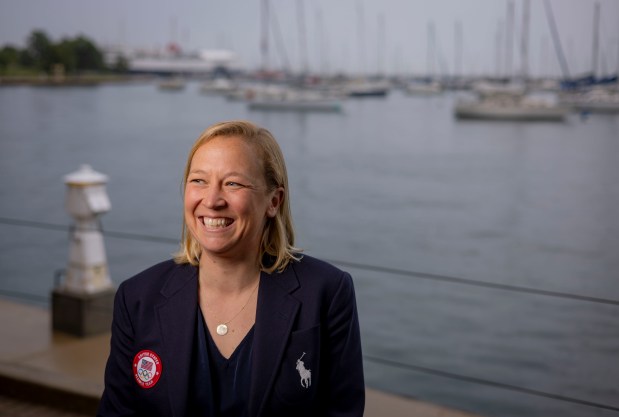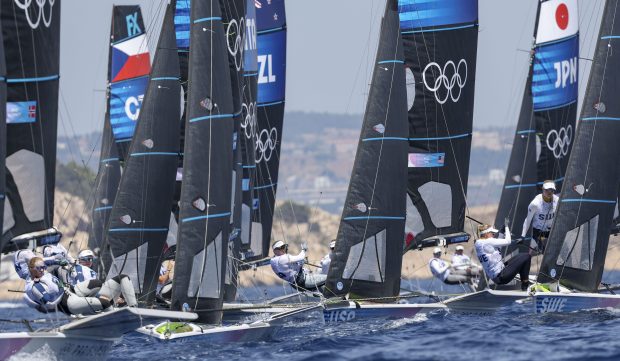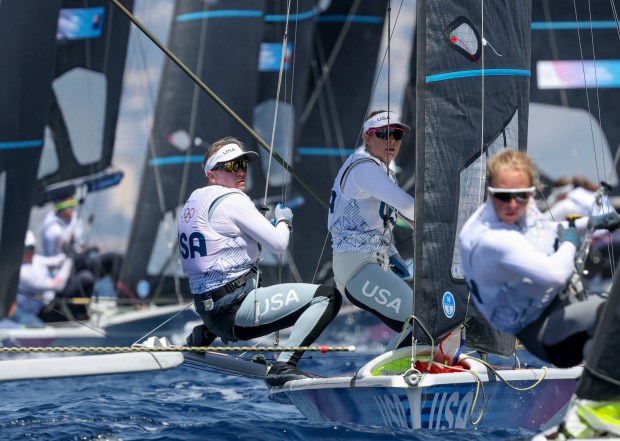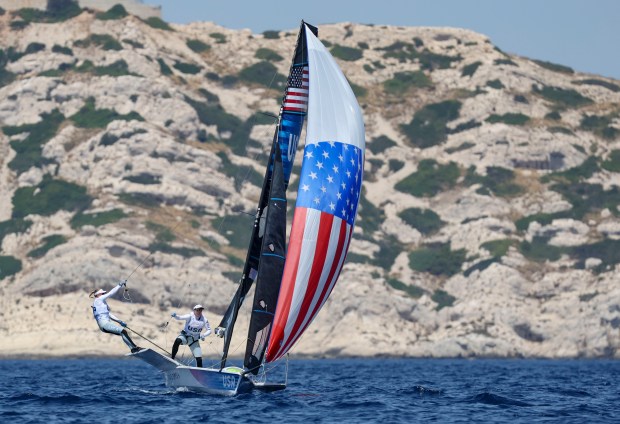MARSEILLE, France — On her trips back to Chicago, Olympic sailor Maggie Shea makes sure to look out the airplane window and take stock of Lake Michigan.
She wants to see how the waves are cresting, how the current is moving. She locates her old racing circles and checks to see who’s on the water, whether it’s the junior sailors or the big boats.
This is the lake that raised her, that taught her how to sail in unpredictable waters and provided some of her happiest childhood memories. It’s where the Wilmette native sat with her grandpa and listened to him explain racing strategy. It’s where she first competed against rival sailor Stephanie Roble, who would later become her teammate and close friend.
And it’s where, when Shea and Roble needed money to fund their Olympic dream, the Chicago Yacht Club Foundation stepped in to help.
“This lake is my home,” Shea said.
Shea is more than 4,400 miles from home this week, competing in what she says will be her final Summer Games. She and Roble, both 35, are in contention for the medal race on Thursday. They’re currently in 12th place after the first three days of racing in the women’s skiff event. The top 10 race in the finals.
“It’s our second Olympics together, and we’ve known each other for a long time,” Roble said. “So it is nice to really cherish that moment out there.”
The event is taking place off the coast of Marseille, an ancient port city on the Mediterranean Sea about three hours south of Paris by train. The bay’s deep blue waters are known for being occasionally chaotic, as was the case on opening day.
“The water does get really mixed up and choppy, similar to the summer in Chicago,” Shea said. “There’s a sort of washing machine effect that feels pretty familiar so if it’s hard for us, it’s hard for everyone else.”
Shea’s familiarity with Lake Michigan lives in her earliest memories, the product of being born into a sailing family. Her grandfather John Nedeau was the son of a commercial fisherman and a master mariner who competed in a record 66 races from Chicago to Mackinac during his lifetime.
Before Shea became a member of his crew, she would join him — along with her siblings, aunts, uncles and cousins — as he moved the boat from his home in western Michigan to the next race site. Her grandmother would make it a family celebration, eschewing the dried foods typically eaten by sailing crews and stocking the galley with baked goods and Midwestern casseroles.
“We ate like kings,” Shea said. “Then I started doing professional programs and I was, like, ‘This is what you guys eat? Are you OK?’ I just had to accept this was real life now. I was going to be eating bars for three days.”
As Shea grew older, she began racing small dinghies in Belmont Harbor as part of the Chicago Yacht Club’s youth sailing program. She enjoyed the sport so much, she told her grandfather that she wanted to be an Olympian some day.
Nedeau took her dream to heart, sharing his sailing strategies and philosophies with her as his boat, Winddancer, cut across Lake Michigan. He told his friends at the yacht club — where he had been a member for decades — that his granddaughter wanted to be an Olympian.
“I was so embarrassed,” Shea said. “I told him not to say that. It was just a dream, just a concept. But he was proud that I had that dream in the first place.”
In high school, she met Stephanie Roble, a talented sailor from East Troy, Wisconsin, who seemingly loved to race on Lake Michigan as much as Shea did. The girls were fierce competitors on the water, trading outcomes and trophies for several summers. On shore, they liked each other and were as friendly as a teenage rivalry could allow.
They continued to compete against each other after Shea graduated from New Trier High School, with Shea representing Connecticut College and Roble now sailing for Old Dominion University in Virginia. They both spent summers coaching at the Chicago Yacht Club, where the idea of competing together started to crystalize.

They decided to try match racing, which had been introduced as an Olympic sport in 2012. After the event was abruptly removed from the Games following its debut, Roble and Shea began competing on the pro circuit together.
In 2016, they started racing in the 49erFx event and set a goal of making the Tokyo Games. They won bronze at the 2020 World Championships, marking the first world medal for the United States in the event and securing themselves a spot at the next Olympics.
They finished 11th in Tokyo after being eliminated from the competition following an obscure penalty that has since been eliminated from the Olympic rulebook. The disappointing result motivated Shea to stay in for another cycle with Roble, to put her life on hold for another four years as she chased a dream.
And another four years of trying to find a way to pay for it.
The U.S. Sailing Association covers the athletes’ health care and a portion of their training costs, as long as they continue to be among the top sailors in the country. The rest comes from donations, including a significant contribution from the Chicago Yacht Club Foundation.
Each year, for the past decade, the foundation has helped subsidize Shea and Roble’s Olympic quest through grants and assorted fundraisers.
The foundation’s members aren’t benevolent strangers to Shea. They’re family friends who knew her grandfather and still sail with her uncle. They’re people who watched her run around the dock with her siblings whenever her grandpa’s boat came to town and then, decades later, asked how they could help when she decided to compete internationally.
“They’ve supported us since 2014 and they’ve always stepped up for us in a huge way,” Shea said. “We wouldn’t have been able to do what we’ve done without them.”
In thanks for the financial support, Shea and Roble have worked with the foundation on its significant efforts to make sailing, maritime vocations and Lake Michigan more accessible to underserved communities. Shea tries to meet the young sailors — including some who had never been on the water before joining the foundation’s sailing program — during her occasional trips home.
“The idea is to have somebody like Maggie not only win a gold medal in Paris, but to inspire the next group of Olympians and sailors,” said Greg Miarecki, president of the Chicago Yacht Club Foundation. “Because we’re going to need Olympians in 2032, 2036, ’40, and all that. It’s a virtuous circle.”

The day before she left for France, Shea met the Tribune at the yacht club to discuss her upcoming Olympic competition. She had been at the club just a few days earlier for a fundraiser, where she and Roble raffled off some of their 2020 Olympic gear.
At least a dozen people came over to wish her well. A nearby table filled with older women all raised their wine glasses in Shea’s direction. Others stopped to give her a final good luck hug.
Before she left, she pointed to a massive silver cup with the names of the more than 100 Race to Mackinac winners engraved on it. Her grandfather, who died in 2016, is among those listed.
An advocate of amateur racing, Nedeau competed in the Race to Mackinac each year with a crew made up of only family and friends. Shea joined as a teenager and was crewing for him when he won the competition on his 64th attempt in 2011.

More than a dozen years and two Olympics later, Shea often thinks about the words her grandfather offered his crew before they set sail on that winning race. He had gathered everyone together in the cockpit and thanked them for joining him.
There’s no place else I’d rather be right now than here with you guys doing this, he said.
Ever her grandfather’s sailor, Shea took a moment before the race to express her gratitude to Roble for their adventures over the past eight years.
“Because I’m in the right place. I’m doing the right thing,” she said. “I’m with my teammate whom I love and adore. I feel like there’s no place I’d rather be.”



